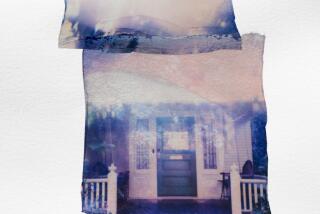The 16th Annual Los Angeles Times Book Prizes : POETRY WINNER, ROBERT PINSKY : An Inferno of Ice : Excerpt from Cantos 32 and 33 of “The Inferno of Dante”
- Share via
In Robert Pinsky’s new translation of “The Inferno of Dante” (part one of Dante’s “Divine Comedy”), the poet Vergil conducts Dante through the region of damnation, where the souls suffer eternal punishments appropriate to their sins.
“In the lowest part of hell,” writes Pinsky, a teacher in the graduate writing program at Boston University, “Dante finds the souls of the betrayers, locked eternally in ice. These souls, when they were alive, froze themselves against the loyalty they owed their friends, family or country. One of the last shades Dante discovers near the very bottom of the pit is Count Ugolino, whose horrible fate on Earth is told in these lines from near the end of ‘The Inferno.’ ”
****
I saw two shades frozen in a single hole--
Packed so close, one head hooded the other one;
The way the starving devour their bread, the soul
Above had clenched the other with his teeth
Where the brain meets the nape. And at the skull
And other parts, as Tydeus berserk with wrath
Gnawed at the head of Menalippus, he chewed.
“You, showing such bestial hatred for him beneath,
Whom you devour: tell me your reason,” I cried,
“And, on condition that your grievance is right,
Knowing both who you are and what wrong deed
This one committed against you, I may yet
Repay you for whatever you may say,
Up in the world above--by telling it,
If that with which I speak does not go dry.”
Pausing in his savage meal, the sinner raised
His mouth and wiped it clean along the hair
Left on the head whose back he had laid waste.
Then he began: “You ask me to endure
Reliving a grief so desperate, the thought
Torments my heart even as I prepare
To tell it. But if my words are seeds, with fruit
Of infamy for this traitor that I gnaw,
I will both speak and weep within your sight.
I don’t know who you are that come here, or how,
But you are surely Florentine to my ear.
I was Count Ugolino, you must know:
This is Archbishop Ruggieri. You will hear
Why I am such a neighbor to him as this:
How, through my trust and his devices, I bore
First being taken, then killed, no need to trace;
But things which you cannot have heard about--
The manner of my death, how cruel it was--
I shall describe, and you can tell from that
If he has wronged me. A slit in the Tower Mew
(Called Hunger’s Tower after me, where yet
Others will be closed up) had let me view
Several moons already, when my bad dream
Came to me, piercing the future’s veil right through:
This man appeared as lord of the hunt; he came
Chasing a wolf and whelps, on that high slope
That blocks the Pisans’ view of Lucca. With him
His lean hounds ran, well trained and eager; his troop--
Gualandi, Sismondi, Lanfranchi--had been sent
To ride in front of him. With no escape.
After a short run, father and sons seemed spent;
I saw their flanks, that sharp fangs seemed to tear.
I woke before dawn, hearing the complaint
Of my own children, who were with me there,
Whimpering in their sleep and asking for bread.
You grieve already, or truly cruel you are,
As you think of what my heart began to dread--
And if not now, then when do you shed a tear?
They were awake now, with the hour when food
Was usually brought us drawing near,
And each one apprehensive from his dream.
And then I heard them nailing shut the door
Into that fearful tower--a pounding that came
From far below. Hearing that noise, I stared
Into my children’s faces, not speaking to them.
Inside me I was turned to stone, so hard
I could not weep; the children wept. And my
Little Anselmo, peering at me, inquired:
‘Father, what ails you?’ And still I did not cry,
Nor did I answer, all that day and night
Until the next sun dawned. When one small ray
Found its way into our prison, and I made out
In their four faces the image of my own,
I bit my hands for grief; when they saw that,
They thought I did it from my hunger’s pain,
And suddenly rose. “Father: our pain,” they said,
“Will lessen if you eat us--you are the one
Who clothed us in this wretched flesh: we plead
For you to be the one who strips it away.”
I calmed myself to grieve them less. We stayed
Silent through that and then the following day.
O you hard earth, why didn’t you open then?
When we had reached the fourth day, Gaddo lay
Stretched at my feet where he had fallen down:
‘Father, why don’t you help me?’ he said, and died.
And surely as you can see me, so one by one
I watched the others fall till all were dead,
Between the fifth day and sixth. And I,
Already going blind, groped over my brood--
Calling to them, though I had watched them die,
For two long days.
And then the hunger had more power than even sorrow had over me.”
When he had finished, with a sideways stare
He gripped the skull again in his teeth, which ground
Strong as a dog’s against the bone he tore.
More to Read
Sign up for our Book Club newsletter
Get the latest news, events and more from the Los Angeles Times Book Club, and help us get L.A. reading and talking.
You may occasionally receive promotional content from the Los Angeles Times.







